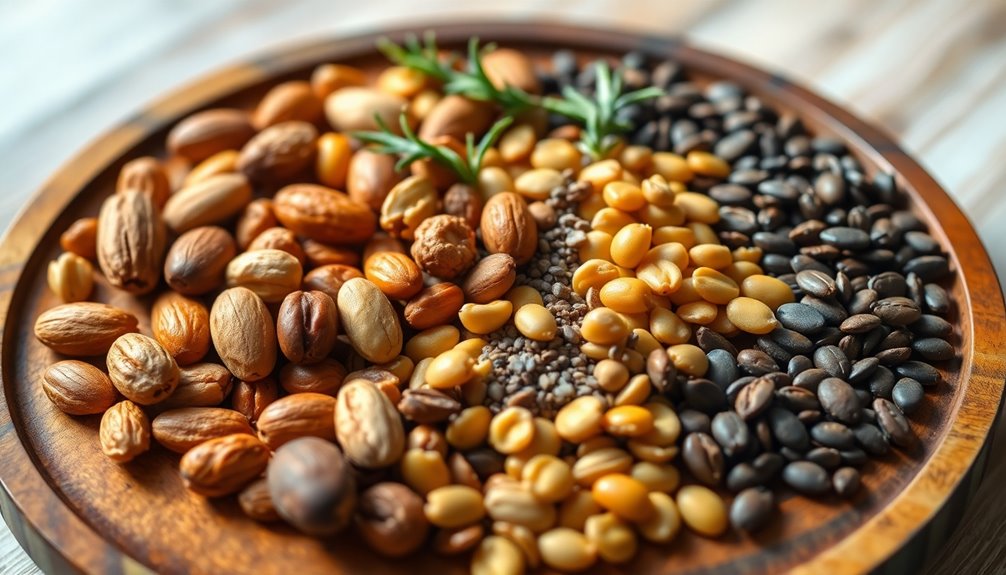To strengthen your immune system, focus on incorporating a mix of nutrient-rich foods. Start with citrus fruits, brimming with Vitamin C, which aids tissue repair and provides anti-inflammatory benefits. Don't overlook leafy greens; they're packed with vitamins A, C, and K, plus antioxidants. Nuts and seeds are excellent sources of Omega-3s that boost your overall health. Lean proteins, especially fatty fish like salmon, support immune cell production. Finally, include fermented foods like yogurt to enhance gut health with probiotics. These choices can greatly enhance your immunity, and there's even more to explore about ideal nutrition.
Key Takeaways
- Citrus fruits like oranges and grapefruits are high in Vitamin C, enhancing immune function and boosting white blood cell production.
- Leafy greens such as spinach and kale provide essential vitamins A, C, and K, supporting immune cell function and overall health.
- Nuts and seeds, including almonds and flaxseeds, contain healthy fats, proteins, and antioxidants that strengthen the immune system.
- Lean proteins like chicken, fish, and legumes provide necessary amino acids to support antibody production and immune response.
- Fermented foods, such as yogurt and kimchi, are rich in probiotics that promote gut health, reducing inflammation and infection risk.
Citrus Fruits

When it comes to boosting your immune system, incorporating citrus fruits into your diet can make a significant difference. These vibrant fruits, like oranges, lemons, and grapefruits, are packed with Vitamin C, which is renowned for its immune-enhancing properties. You might be surprised to learn that just one medium orange can provide you with about 70 mg of Vitamin C, exceeding the daily recommended intake.
This nutrient is essential for the growth and repair of tissues, and it plays a vital role in fighting off infections.
To make the most of the Vitamin C benefits, consider adding citrus fruits to your daily meals. You can whip up easy immune-enhancing recipes like a zesty citrus salad or a revitalizing lemon-infused water to start your day.
Mixing citrus juices into your smoothies or using them as marinades not only enhances flavor but also increases your Vitamin C intake.
It's also worth noting that citrus fruits contain flavonoids, which have anti-inflammatory and antioxidant properties. These compounds work synergistically with Vitamin C to enhance your immune response, helping you stay healthy and energetic.
Leafy Greens

Leafy greens are a powerhouse for your immune system, offering a wealth of nutrients that can help keep you healthy. Packed with vitamins A, C, and K, as well as antioxidants, these greens play a pivotal role in supporting your body's defenses. Incorporating them into your diet is a simple and tasty way to enhance your overall well-being.
One great way to enjoy leafy greens is through delicious smoothie recipes. Blend spinach or kale with your favorite fruits and a splash of almond milk for a nutrient-dense drink that boosts your immune system. You'll not only love the taste, but you'll also be giving your body the vitamins it craves. Plus, smoothies are an easy way to sneak in those greens if you're not a fan of salads. Additionally, using leafy greens in smoothies aligns perfectly with the smoothie diet program, which emphasizes health benefits through whole foods.
Speaking of salads, immune-boosting salads are another fantastic option. Create a vibrant mix of arugula, romaine, or Swiss chard, and top it off with colorful veggies, seeds, and a zesty dressing. This combination not only looks appealing but also provides a pivotal array of nutrients that can help fend off illness.
Nuts and Seeds

Nuts and seeds are excellent additions to your diet if you want to bolster your immune system. Packed with essential nutrients, these tiny powerhouses deliver significant health benefits. They're rich in vitamins and minerals like vitamin E, zinc, and selenium, all of which play crucial roles in supporting your immune response.
One of the standout features of nuts and seeds is their antioxidant benefits. Antioxidants help combat oxidative stress in your body, which can weaken your immune defenses. For instance, walnuts and almonds aren't only delicious but also provide a wealth of antioxidants, helping to shield your cells from damage. Including a variety of nuts in your diet can give your body the tools it needs to fight off illness more effectively.
Additionally, nuts and seeds are excellent Omega 3 sources, particularly flaxseeds and chia seeds. Omega 3 fatty acids are known for their anti-inflammatory properties, which can further enhance your immune system. By incorporating these healthy fats into your meals, you're not just adding flavor; you're also reinforcing your body's ability to fend off infections.
You don't have to eat them alone! Tossing a handful of mixed nuts into your yogurt or sprinkling seeds on your salad can make a huge difference. Furthermore, a plant-based diet that includes an array of these nutrient-dense foods can significantly enhance overall health and immune function. So, embrace the crunch of nuts and seeds in your diet. They're not only tasty but also a simple way to feel more connected to your health and well-being. Your immune system will thank you!
Lean Proteins

Incorporating lean proteins into your diet is a wise move for strengthening your immune system. Lean proteins, such as chicken, turkey, and fish, provide essential amino acids that play a pivotal role in supporting immune function. These proteins help in the production of antibodies and immune cells, which are essential for defending your body against infections.
Don't overlook plant-based proteins, either. Options like lentils, chickpeas, and quinoa not only offer protein but also come packed with vitamins and minerals that enhance immunity. By including a variety of protein sources, you ensure your body receives a wide range of nutrients necessary for peak health.
When it comes to fish, the benefits are particularly remarkable. Fatty fish like salmon and mackerel are rich in omega-3 fatty acids, which can boost your immune response. Omega-3s have anti-inflammatory properties, helping to regulate the immune system and potentially lowering the risk of chronic diseases. So, adding fish to your weekly meals can be a tasty way to fortify your defenses.
Don't forget about eggs, too. They're another excellent source of high-quality protein and contain important vitamins like D and B12, which also support immune health. Additionally, incorporating whole food sources of protein into your diet can offer better nutrition without the risks associated with processed options. By diversifying your protein intake and including both animal and plant-based options, you're setting the stage for a strong immune system. So, why not start today? Your body will thank you!
Fermented Foods

Fermented foods are a powerhouse for your immune system, packed with beneficial probiotics that support gut health. Including items like yogurt, kimchi, sauerkraut, and kefir in your diet can enhance your body's natural defenses. These foods undergo a fermentation process that not only preserves them but also enriches them with live bacteria that contribute to a healthy gut microbiome.
When you consume fermented foods, you're introducing a diverse array of probiotics into your system. These microorganisms play a critical role in balancing your gut flora, which can lead to improved gut health. A well-functioning gut is essential for proper digestion and nutrient absorption, and it also helps regulate your immune response.
Research shows that a healthy gut can reduce inflammation and lower the risk of infections, making it a key player in your overall health. Additionally, following a custom keto diet plan that includes these foods can further optimize your immune system by providing tailored nutrition.
Incorporating fermented foods into your meals is simple and delicious. You could add yogurt to your morning smoothie or enjoy a side of kimchi with your lunch. These small changes can have significant impacts on your immune system over time. Plus, sharing these foods with friends or family can foster a sense of community, as food has a unique way of bringing people together.
Frequently Asked Questions
How Do Stress Levels Affect Immune System Function?
Stress levels can greatly impact your immune system response. When you're stressed, your body produces hormones like cortisol that can dampen immunity, making you more susceptible to illness. It reduces the effectiveness of your immune cells, which are vital for fighting infections.
Managing stress through relaxation techniques or regular exercise can help maintain a strong immune system. Remember, taking care of your mental well-being is just as important as physical health for overall immunity!
Can Sleep Quality Influence My Immune Health?
Absolutely, sleep quality plays an essential role in your immune health. When you get enough restorative sleep, your immune response strengthens, helping your body fight off infections. Poor sleep patterns can increase your susceptibility to sickness, leaving you vulnerable to illnesses. Prioritizing good sleep habits not only enhances your overall well-being but also boosts your body's defenses. So, make sleep a priority and watch how it positively impacts your immune system!
What Role Does Hydration Play in Immunity?
You might be surprised to learn that proper hydration can greatly enhance your immune response. When you maintain ideal water intake, your body efficiently transports nutrients and removes toxins, aiding your immune system function at its peak.
Dehydration can lead to a weakened defense against infections, making it crucial to drink enough water daily. So, grab that water bottle and stay hydrated—your immune health will thank you!
Are There Any Supplements That Boost Immune Function?
Yes, there are several supplements that can boost your immune function.
Herbal remedies like echinacea and elderberry have shown promise in enhancing immune responses.
Additionally, Vitamin C is well-known for its role in supporting immune health and can help reduce the duration and severity of colds.
While supplements can be beneficial, it's important to combine them with a balanced diet and healthy lifestyle for best immune support.
How Does Regular Exercise Impact the Immune System?
When you think of exercise, you might picture a sweat-drenched workout, but it's so much more than that. Regular exercise benefits you by enhancing your immune response, helping your body fend off illnesses more effectively.
It increases circulation, allowing immune cells to travel throughout your body. Plus, it reduces stress and inflammation, both of which can weaken your defenses. So, don't just sit there—get moving for a healthier you!
Conclusion
To keep your immune system strong, think of your body as a fortress. By incorporating citrus fruits, leafy greens, nuts, lean proteins, and fermented foods into your diet, you're building walls of defense against illness. Each bite fuels your body with essential nutrients that work together like a well-oiled machine. So, stock up on these immune-boosting foods and give your body the support it needs to fend off challenges. Your health is your greatest treasure—protect it wisely!



